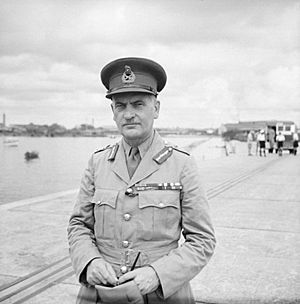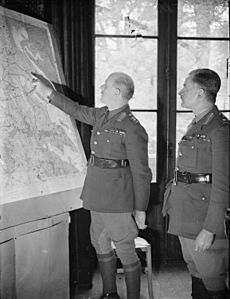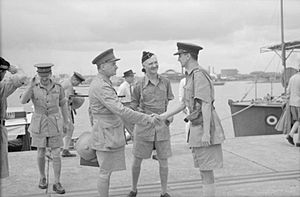Henry Pownall facts for kids
Quick facts for kids
Sir Henry Pownall
|
|
|---|---|

Lieutenant General Sir Henry Pownall, 1941.
|
|
| Born | 19 November 1887 London, England |
| Died | 10 June 1961 (aged 73) London, England |
| Allegiance | United Kingdom |
| Service/ |
British Army |
| Years of service | 1906–1945 |
| Rank | Lieutenant-General |
| Service number | 3553 |
| Unit | Royal Field Artillery Royal Artillery |
| Commands held |
|
| Battles/wars | |
| Awards |
|
| Relations |
|
Lieutenant General Sir Henry Royds Pownall (born 19 November 1887 – died 10 June 1961) was an important officer in the British Army. He held many key leadership roles during World War II. He was a top advisor, known as a chief of staff, for important military groups.
For example, he was the chief of staff for the British Expeditionary Force (BEF) in France and Belgium. This was until the Battle of France in 1940. Later, he worked with General Sir Archibald Wavell until Singapore fell in 1942. He also served as chief of staff for Admiral Lord Louis Mountbatten in South East Asia from 1943 to 1944.
Contents
Early Life and Military Start
Henry Royds Pownall was born in London, England, on 19 November 1887. His father, Charles Pownall, was an engineer who worked with Japanese railways. Henry lived in Japan from age three to eight.
He went to Rugby School and the Royal Military Academy, Woolwich. In 1906, he joined the Royal Field Artillery as a second lieutenant. He started his army career with the Royal Horse Artillery in Lucknow, India. By 1909, he was promoted to lieutenant.
Serving in the First World War
During the First World War, Pownall fought on the Western Front in France and Belgium. He became a captain in 1914.
He received the Military Cross in 1917 for his bravery. He was also promoted to major that same year. Pownall was a Brigade Major for the 17th Division from 1917 to 1919. He was recognized twice for his service during the war. He also received the Distinguished Service Order in 1918.
Between the World Wars
In 1918, Pownall married Lucy Louttit. She was the widow of Captain John Gray, an officer who died in 1916. Henry and Lucy did not have children together, but he became a stepfather to Lucy's son, Willoughby Gray.
Pownall continued his military education at the Staff College, Camberley from 1920 to 1921. He then worked at the Royal School of Artillery from 1924 to 1925. He became a brevet lieutenant-colonel in 1928.
After his training, he took part in operations on the north-west frontier of India until 1931. For this, he was recognized a third time. He also received an extra award, a bar, for his Distinguished Service Order.
In 1932, Pownall attended the Imperial Defence College. After this, he held several important staff jobs. He worked for the Committee of Imperial Defence from 1933 to 1936. He became a full lieutenant-colonel in 1935. He was promoted to colonel that same year.
From 1936 to 1938, he was in charge of the Royal School of Artillery. He held the rank of brigadier. As the threat of war grew, he became the Director of Military Operations and Intelligence in the War Office from 1938 to 1939. He was promoted to major-general in 1938.
Serving in the Second World War

When Britain entered World War II in September 1939, Pownall was made Chief of General Staff for the British Expeditionary Force (BEF). He served in this role in France and Belgium until France fell in June 1940. He was honored with the Knight Commander of the Order of the British Empire award in July 1940.
After this, Pownall became an inspector for the new Home Guard. He also commanded British Troops in Northern Ireland. In 1941, he became the Vice Chief of the Imperial General Staff (VCIGS) in the War Office.
Pownall then became commander-in-chief of the British Far East Command in South East Asia from December 1941 to 1942. This command was later replaced by ABDACOM. Pownall became chief of staff to General Sir Archibald Wavell. He was recognized again for his service. He also received an award from the Queen of the Netherlands, Queen Wilhelmina of the Netherlands.
After ABDACOM was dissolved in February 1942, Pownall took over as Commander-in-Chief, Ceylon. Then, in 1943, he became commander-in-chief of the Persia and Iraq areas. Finally, he was chief of staff to Vice Admiral Louis Mountbatten. Mountbatten was the Supreme Commander of the Allied South East Asia Command from 1943 to 1944.
Pownall had an operation in August 1944 and returned to duty in October. Mountbatten had concerns about Pownall's health and asked for a new chief of staff. Pownall handed over his role to Lieutenant-General Frederick Browning in December 1944.
Pownall received another honor, the Knight Commander of the Order of the Bath, in January 1945. He did not hold any more commands after this. He retired from the British Army on 8 September 1945.
After the War
After the war, Sir Henry Pownall became chairman of Friary Meux Limited. He was also a member of the committee for Lloyds Bank.
He served as the Chief Commissioner of the St. John Ambulance Brigade from 1947 to 1949. In 1951, he became the chancellor of the Order of St John. He also worked as a military advisor for Winston Churchill's book series, The Second World War, from 1948 to 1954.
Sir Henry Pownall passed away in London on 10 June 1961, at the age of 73. His personal papers are kept at the Liddell Hart Centre for Military Archives.
 | Aaron Henry |
 | T. R. M. Howard |
 | Jesse Jackson |


